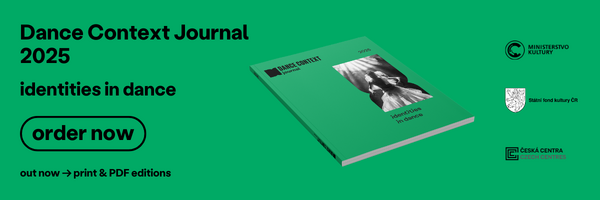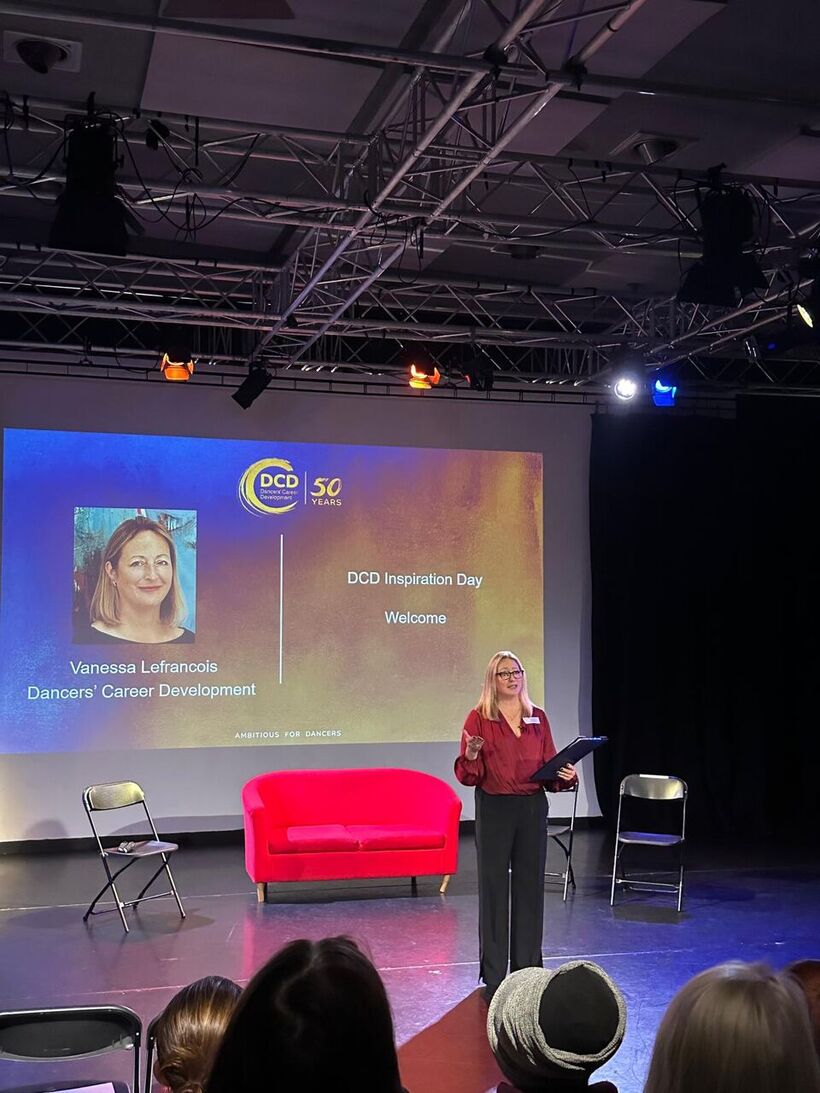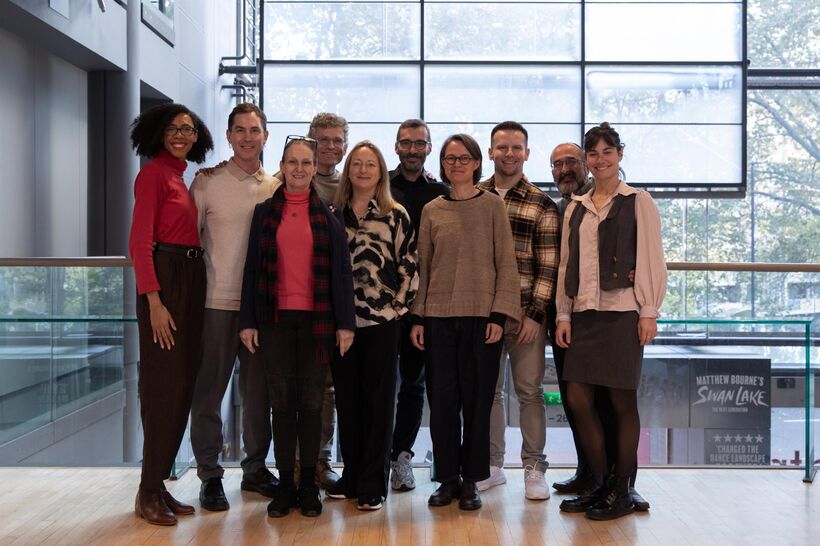Dancers have become really good at reinventing themselves, second career is not a taboo anymore, says Vanessa Lefrançois from DCD
British organization Dancers’ Career Development (DCD) celebrates its 50th anniversary, marking half a century of supporting professional dancers in transitioning to fulfilling second careers. To commemorate this milestone, DCD hosted an Inspiration Day, an event celebrating the resilience and versatility of dancers. DCD’s Executive Director Vanessa Lefrançois, in the following interview, explored the evolving challenges and opportunities for dancers, the impact of DCD’s initiatives, and the inspiring ways dancers are leveraging their skills to reinvent themselves both within and beyond the dance industry.
You recently held Inspiration Day, which celebrated the 50th anniversary of the organisation. Are you satisfied with the overall event and participation?
We were really delighted. We’ve been building to that event over a year, we actually had several other events in different parts of UK which all led to the final one in London. It was a great opportunity to bring people together across the dance sector. There were lots of dancers present, but there were also organisations which support dancers in different ways, charities for dancing parents, but also several of our partner dance companies were there. And it was one of the first opportunities coming out of the pandemic to have a real symposium type of event. Not only where are people participating in discussions, but they also have a lot of opportunities to network and meet supporters and funders. Simply put, to have dialogue, and I think this has been missing in this sector in the UK. We are still very much online, so people really appreciated this kind of personal interaction and engagement.
The event showed the real potential of dancers to utilise their transferable skills to move into any career they want to. And that is our mission, to help to enable dancers to follow the trajectory they want to go on.
The main funder of the Inspiration Day was Arts Council England (ACE). Afterwards, they spoke to their counterparts in Scotland and Wales, and we are in the process of following up with them, to see if they are interested in organizing a similar kind of event. This is a great endorsement for DCD as it was the first time in 20 years that we received funding from ACE.
People in general were talking about it a lot, which makes us very happy.
What is your personal highlight from this event?
There were lots of really sound advice and insights, I loved the way how the artistic director of Chameleon talked about walking towards your fear, which I think is a really empowering idea. Another impressive one was by Leigh Thomas, who said that you can’t build your future in the containers of the past. It is very important to learn from the past, but it is also important to go towards your own future, simply move forward. There were lots of brilliant moments.
This is your second year in office. What else have you achieved since your appointment?
It’s been a very busy time. I arrived just when the 50th anniversary year was starting. We did a performance Gala in the Royal Opera House right at the beginning when I first joined. That enabled me to meet many influential people from the charity's past, which was a great opportunity to understand the charity better.
We also ran two very successful fundraising campaigns. We’ve just finished one today, and we exceeded our target by 10,000 GBP, which is just fantastic because, in total, we raised 50,000 GBP. All this money will go directly to supporting dancers and to developing their future careers.
Lots of this year was about change. Obviously, the new leadership, then we also moved out of our offices in London and became a fully remote working organization. It has had its challenges, but at the same time, benefits: we have been reducing our expenses so we can direct more of the charity’s funds to dancers. We are spread out across the UK, there are people in different regions, which is very practical because we can help dancers in all places.
There has also been a lot of reviewing of current programs, and we are in the process of writing a business plan for the next two years based on this year’s learning and analysis. We are refining some programs, have stopped some completely, and are developing new ones – in response to dancers’ needs and demands.
We especially look forward to extending our mentoring programme, which is very successful already. We are developing a program that will try to harness dancers’ skills, retain them within the sector, and move them up to more senior positions.
What does DCD do? Could you briefly introduce all its activities?
Sure. We are here for dancers at any point in their career. We start by going into dance schools and conservatoires to talk to students before they move into the profession, just to introduce the concept of DCD, but also to give them advice to keep up with and develop their hobbies because for many of them those will become a future career.
Then we offer one-to-one advice for dancers at any point in their career so they can come just to talk, whether they're experiencing issues, they've got injured or are a bit stuck. We either signpost them to programmes we deliver or to other organisations that might be able to support them in different ways.
One of our main offers are retraining and career exploration grants. These are opportunities for dancers to try something new, e.g., to go on a course, or study a university programme to upskill so they can move into the profession they're interested in. We do give out a lot of these grants, about 75 a year. We also run a mentoring program where dancers are paired up with executives from different industries and we also offer lot of coaching. Only last year, we ran 400 coaching sessions. We also do online and in-person workshops. The digital content is focused around two areas: One is professional development, very much focused on skills that people might need, be they sort of communication skills or more business skills. The other area is based around psychological well-being. It helps dancers really care for themselves, covering topics like imposter syndrome or the difference between pressure and stress.
You mentioned that you give out up to 75 grants per year. That's a high number. I was wondering how high can get the subsidies?
It depends if you're with one of our partner companies or you're an independent, freelance dancer. First of all, we work with six partner companies (The Royal Ballet, English National Ballet, Scottish Ballet, Birmingham Royal Ballet, Northern Ballet and Rambert) which offer dancers full-time, permanent contracts, and therefore the organisation, or DCD, provide services to those companies to support their dancers. Each year, we get a percentage of the dancers' salaries to basically deliver things like grants, coaching and workshops, etc. Those dancers are able to access a career exploration grant, which is up to £1,250 and, depending on how long they've been with the organisation, they can access grants up to £15,000.
Freelance dancers they can get up to £4,000. There is a big difference because we don't have a membership scheme within the independent dance sector. In these cases, we really have to work hard on fundraising in order to raise money to award these grants.
Are there any regular funders of your organization?
Partly, it's the service charge I’ve just mentioned based on the dancers' salaries. Apart from that, it’s a mix of trusts and foundations, which requires a lot of application writing on a regular basis. But we also have individual supporters, and then there is earned income for workshops, or maybe a company that's not one of our partner companies ask if we can deliver some coaching to their dancers, or a workshop.
What is the service charge percentage from the overall dancers’ pay?
It's about 2.5%. It is quite low compared to other places like the Netherlands, but enough to ensure support when the dancers retire and it’s time for them to move on.
What is the percentage of the amount coming from these service charges in your budget per year?
Our overall income is around £730,000 a year and approximately £300,000 comes from the partner companies.
DCD has been operating for 50 years. What would you say has changed the most in that time?
I think there's more demand because there are more dancers. The industry's grown but also changed a lot. There used to be more partner companies that had regular funding and could afford to give dancers permanent contracts. There's a lot more instability in the sector now around what dancers are paid, which hasn't kept up with inflation
Also, a lot of dancers have, by necessity, got much more portfolio careers where they're doing many different things at the same time. I think dancers have become really good at reinventing themselves, which is great in many ways, but also quite challenging and exhausting.
During those 50 years, we also managed to normalize the concept of career transition; it is not a taboo topic anymore. Before, people were afraid that it could negatively impact their dancing career, now dancers and companies are much more open. And that is super beneficial because dancers are sharing how they're feeling, what they're experiencing. And companies have really stepped up and said: well if you're feeling like that and you're interested in exploring a career in marketing, why don't you come and spend a month in the summer in our marketing team? So, there’s been a really positive culture shift, and it’s made a significant difference.
You are also part of the International Organization for the Transition of Professional Dancers (IOTPD) and, therefore, have an international comparison. How is the situation of British dancers different from those in other countries?
This has been really fascinating for me to hear about the different structures that organizations have in IOTPD member countries. They vary dramatically. In some countries, like Germany, it's very much about a career for life: you dance into your 50s, you work with one company, and you're very well looked after. France is another case; they don't give out grants because dancers are better looked after by the state. Also, countries like the Netherlands have fewer freelance dancers than we do in the UK and also have a membership scheme freelance dancers can join.
What's really productive about that group is that we all share how different projects work, which brings a lot of inspiration. Within the short time I've been at DCD, that has been very helpful and informative. For example, in Switzerland, they're going to be trialling a “euro per ticket” concept to try and raise money to support dancers. And I'm keen to see how that works out.
What do you think are the biggest challenges for DCD in the future?
There is a growing demand for our services, which is partly because we have become a lot more visible during the last 50 years. And this also comes with the need to raise more funds for our activities. But lately, the world has been the most difficult fundraising landscape I've ever witnessed in my life. There are so many charities applying for funding, and there are funders who are just closing their books or saying they won’t take any unsolicited applications, so you have to be invited. This is why we're putting quite a lot of energy into finding individual philanthropists who are really interested in dance.
Vanessa Lefrançois
Vanessa is the Executive Director of Dancers’ Career Development; she formerly worked as a freelance consultant in the arts and cultural sector, and has experience in senior leadership roles including Joint Director and CEO of Oxford Playhouse; Artistic Director and CEO of the Brewhouse Theatre & Arts Centre, Somerset; and Director of Recreational & Prevocational Dance at The Place, London.
Vanessa spent the first 15 years of her career working internationally as a freelance choreographer and director for opera, theatre and dance companies. A Trustee of South East Dance, Vanessa also sits on the OxLEP Culture and Visitor Economy Sub-Group and Tourism Task Force.
Vanessa has an Executive MBA (with Distinction), Bayes Business School (formerly Cass); BA (Hons) in Arts Practice and Cultural Studies (First), Coventry University; and trained at London Contemporary Dance School and Alvin Ailey, New York.





